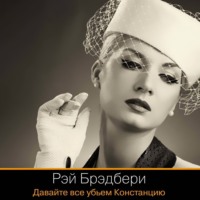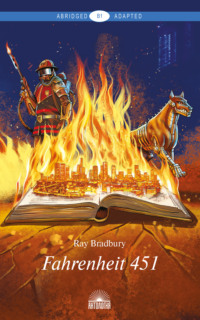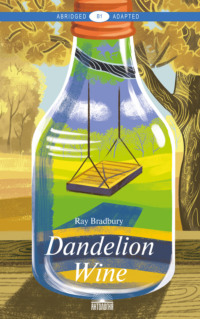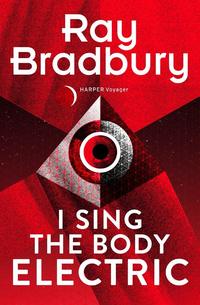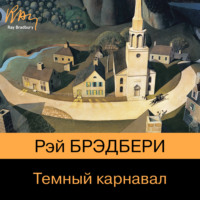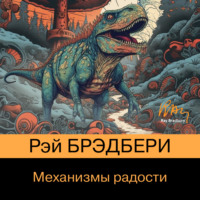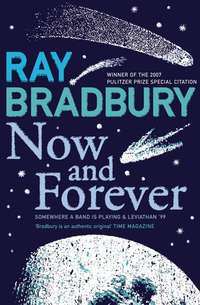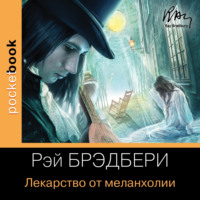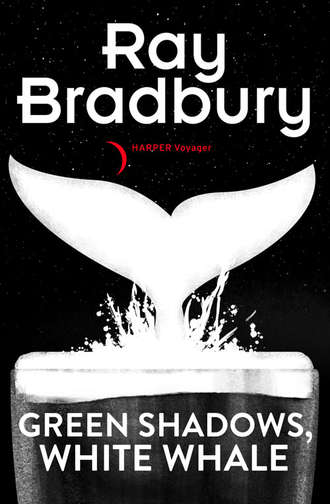
Полная версия
Green Shadows, White Whales
Beyond, there was a blind stagger of feet, heavy panting coming near, near, near!
“What …?” I said.
Mike shut his eyes. “Sssst! Listen! … Yes!”
Chapter 4
Shoes pounded the outside steps, drunkenly. The double wing doors slammed wide. A battered man lunged in, reeling, holding his bloody head with bloody hands. His moan froze every customer at the bar. For a time you heard only the soft foam popping in the lacy mugs, as the customers turned, some faces pale, some pink, some veined and wattle red. Every eyelid down the line gave a blink.
The stranger swayed in his ruined clothes, eyes wide, lips trembling. The drinkers clenched their fists. Yes! they cried silently. Go on, man! What happened?
The stranger leaned far out on the air.
“Collision,” he cried. “Collision on the road.”
Then, chopped at the knees, he fell.
“Collision!” A dozen men rushed at the body.
“Kelly!” Heeber Finn vaulted the bar. “Get to the road! Mind the victim—easy does it! Joe, run for the Doc!”
“Wait!” said a quiet voice.
From the private stall at the end of the pub, the cubby where a philosopher might brood, a dark man blinked out at the crowd.
“Doc!” cried Heeber Finn. “Was you there all the time?”
“Ah, shut up!” cried the Doc as he and the men hustled out into the night.
“Collision …” The man on the floor twitched his lips.
“Softly, boys.” Heeber Finn and two others gentled the victim atop the bar. He looked handsome as death on the fine inlaid wood, with the prismed mirror making him two dread calamities for the price of one.
Outside on the steps, the crowd halted, shocked as if an ocean had sunk Ireland in the dusk and now bulked all about them. Fog in fifty-foot rollers and breakers put out the moon and stars. Blinking, cursing, the men leaped out, to vanish in the deeps.
Behind, in the bright doorframe, I stood, dreading to interfere with what seemed village ritual. Since arriving in Ireland, I could not shake the feeling that at all times I was living stage center of the Abbey Theatre. Now, not knowing my lines, I could only stare after the rushing men.
“But,” I protested weakly, “I didn’t hear any cars on the road.”
“You did not!” said Mike, almost pride fully. Arthritis limited him to the top step, where he teetered, shouting at the white tides where his friends had submerged. “Try the crossroad, boys! That’s where it most often does!”
“The crossroad!” Far and near, footsteps rang.
“Nor,” I said, “did I hear a collision.”
Mike snorted with contempt. “Ah, we’re not great ones for commotion, or great crashing sounds. But collision you’ll see if you step on out there. Walk, now, don’t run! It’s the devil’s own night. Running blind you might hit into Kelly, beyond, who’s fevered up with pumping just to squash his lungs. Or you might head-on with Feeney, too drunk to find any road, never mind what’s on it! Finn, you got a torch, a flash? Blind you’ll be, lad, but use it. Walk now, you hear?”
I groped through the fog and, immersed in the night beyond Heeber Finn’s, made direction by the heavy clubbing of shoes and a rally of voices ahead. A hundred yards off in eternity, the men approached, grunting whispers: “Easy now!” “Ah, the shameful blight!” “Hold on, don’t jiggle him!”
I was flung aside by a steaming lump of men who swept suddenly from the fog, bearing atop themselves a crumpled object. I glimpsed a bloodstained and livid face high up there, then someone cracked my flashlight down.
By instinct, sensing the far whiskey-colored light of Heeber Finn’s, the catafalque surged on toward that fixed and familiar harbor.
Behind came dim shapes and a chilling insect rattle.
“Who’s that!” I cried.
“Us, with the vehicles,” someone husked. “You might say we got the collision.”
The flashlight fixed them. I gasped. A moment later, the battery failed.
But not before I had seen two village lads jogging along with no trouble at all, easily, lightly, toting under their arms two ancient black bicycles minus front and tail lights.
“What …?” I said.
But the lads trotted off, the accident with them. The fog closed in. I stood abandoned on an empty road, my flashlight dead in my hand.
By the time I opened the door at Heeber Finn’s, both “bodies,” as they called them, had been stretched on the bar.
And there was the crowd lined up, not for drinks, but blocking the way so the Doc had to shove sidewise from one to another of these relics of blind driving by night on the misty roads.
“One’s Pat Nolan,” whispered Mike. “Not working at the moment. The other’s Mr. Peevey from Maynooth, in candy and cigarettes mostly.” Raising his voice: “Are they dead, now, Doc?”
“Ah, be still, won’t you?” The Doc resembled a sculptor troubled at finding some way to finish up two full-length marble statues at once. “Here, let’s put one victim on the floor!”
“The floor’s a tomb,” said Heeber Finn. “He’ll catch his death down there. Best leave him up where the warm air gathers from our talk.”
“But,” I said quietly, confused, “I’ve never heard of an accident like this in all my life. Are you sure there were absolutely no cars? Only these two men on their bikes?”
“Only?” Mike shouted. “Great God, man, a fellow working up a drizzling sweat can pump along at sixty kilometers. With a long downhill glide his bike hits ninety or ninety-five! So here they come, these two, no front or tail lights—”
“Isn’t there a law against that?”
“To hell with government interference! So here the two come, no lights, flying home from one town to the next. Thrashing like Sin Himself’s at their behinds! Both going opposite ways but both on the same side of the road. Always ride the wrong side of the road, it’s safer, they say. But look on these lads, fair destroyed by all that official palaver. Why? Don’t you see? One remembered it, but the other didn’t! Better if the officials kept their mouths shut! For here the two be, dying.”
“Dying?” I stared.
“Well, think on it, man! What stands between two able-bodied hell-bent fellas jumping along the path from Kilcock to Maynooth? Fog! Fog is all! Only fog to keep their skulls from bashing together. Why, look, when two chaps hit at a cross like that, it’s like a strike in bowling alleys, tenpins flying! Bang! There go your friends, nine feet up, heads together like dear chums met, flailing the air, their bikes clenched like two tomcats. Then they all fall down and just lay there, feeling around for the Dark Angel.”
“Surely these men won’t …”
“Oh, won’t they? Why, last year alone in all the Free State no night passed some soul did not meet in fatal collision with another!”
“You mean to say over three hundred Irish bicyclists die every year, hitting each other?”
“God’s truth and a pity.”
“I never ride my bike nights.” Heeber Finn eyed the bodies. “I walk.”
“But still then the damn bikes run you down!” said Mike. “A wheel or afoot, some idiot’s always panting up doom the other way. They’d sooner split you down the seam than wave hello. Oh, the brave men I’ve seen ruined or half ruined or worse, and headaches their lifetimes after.” Mike trembled his eyelids shut. “You might almost think, mightn’t you, that human beings was not made to handle such delicate instruments of power.”
“Three hundred dead each year?” I was dazed.
“And that don’t count the ‘walking wounded’ by the thousands every fortnight who, cursing, throw their bikes in the bog forever and take government pensions to salve their all-but-murdered bodies.”
“Should we stand here talking?” I gestured helplessly toward the victims. “Is there a hospital?”
“On a night with no moon,” Heeber Finn continued, “best walk out through the middle of fields, and be damned to the evil roads! That’s how I have survived into this my fifth decade.”
“Ah …” The men stirred restlessly.
The Doc, sensing he had withheld information too long, feeling his audience drift away, now snatched their attention back by straightening up briskly and exhaling.
“Well!”
The pub quickened into silence.
“This chap here …” The Doc pointed. “Bruises, lacerations, and agonizing backaches for two weeks running. As for the other lad, however … ” And here the Doc let himself scowl for a long moment at the paler one there, looking rouged, waxed, and ready for final rites. “Concussion.”
“Concussion!”
The quiet wind rose and fell in the silence.
“He’ll survive if we run him quick now to Maynooth Clinic. So whose car will volunteer?”
The crowd turned as a body toward Timulty. I stared, remembering the front of Heeber Finn’s pub, where seventeen bicycles and one automobile were parked. “Mine!” cried Timulty. “Since it’s the only vehicle!”
“There! A volunteer! Quick now, hustle this victim—gently!— to Timulty’s wreck!”
The men reached out to lift the body, but froze when I coughed. I circled my hand to all and tipped my cupped fingers to my lips. All gasped in soft surprise. The gesture was hardly done when drinks foamed down the bar.
“For the road!”
And now even the luckier victim, suddenly revived, face like cheese, found a mug gentled to his hand with whispers.
“Here, lad, here. Tell us …”
“What happened, eh? Eh?”
“Send,” gasped the victim. “Send for Father Leary. I need the Extreme Unction!”
“Father Leary it is!” Nolan jumped and ran.
“Get my wife,” husked the victim, “to call me three uncles and four nephews and my grandfather and Timothy Doolin, and you’re all invited to my wake!”
“You was always a good sort, Peevey!”
“There’s two gold coins put by in my best shoes at home. For me eyelids! There’s a third gold coin; buy me a fine black suit!”
“It’s good as done!”
“Be sure there’s plenty of whiskey. I’ll buy it meself!”
There was a stir at the door.
“Thank God,” cried Timulty. “It’s you, Father Leary. Father, quickly, you must give the Extremest form of Unction you ever gave!”
“Don’t tell me my business!” said the priest in the door. “I got the Unctions, you provide the victim! On the double!”
There was a cheer from the men as the victim was held high and run for the door where the priest directed traffic, then fled.
With one body gone off the bar, the potential wake was over, the room empty save for myself, the Doc, the revived lad, and two softly cudgeling friends. Outside, you could hear the crowd putting the one serious result of the great collision into Timulty’s car.
“Finish your drink,” the Doc advised.
But I stood, looking numbly around at the pub: at the recovered bicyclist, seated, waiting for the crowd to come back and mill about him; seeing the blood-spotted floor, the two bicycles tilted near the door like props from a vaudeville turn, the dark night waiting outside with its improbable fog; listening to the roll and cadence and gentle equilibrium of these voices, balanced each in its own throat and environment.
“Doctor,” I heard myself say as I placed the money on the bar, “do you often have auto wrecks—collisions between people in cars?”
“Not in our town!” The Doc nodded scornfully east. “If you like that sort of thing, now, Dublin’s the very place!”
Crossing the pub, the Doc took my arm as if to impart some secret which would change my fate. Thus steered, I found the stout inside me a shifting weight I must accommodate from side to side as the Doc breathed softly in my ear.
“Look here now, son, admit it, you’ve traveled little in Ireland, right? Then listen! Biking to Maynooth, fog and ail, you’d best take it fast! Raise a din! Why? Scare the other cyclists and cows off the path, both sides! If you pump slow, why, you’ll creep up on and do away with dozens before they know what took them off! And another thing: when a bike approaches, douse your light—that is, if it’s working. Pass each other, lights out, in safety. Them devil’s own lights have put out more eyes and demolished more innocents than all of seeing’s worth. Is it clear now? Two things: speed, and douse your lights when bikes loom up!”
At the door, I nodded. Behind me I heard the one victim, settled easy in his chair, working the stout around on his tongue, thinking, preparing, beginning his tale:
“Well, I’m on me way home, blithe as you please, assailing downhill near the cross, when …”
Outside, the Doc offered final advice.
“Always wear a cap, lad, if you want to walk nights ever—on the roads, that is. A cap’ll save you the frightful migraines should you meet Kelly or Moran or anyone else hurtling full tilt the other way, full of fiery moss and hard-skulled from birth. Even on foot, these men are dangerous. So you see, there’s rules for pedestrians, too, in Ireland, and wear a cap at night is number one!” He handed me a cap.
Without thinking, I took the brown tweed cap and put it on. Adjusting it, I looked out at the dark mist boiling across the night. I listened to the empty highway waiting for me ahead, quiet, quiet, quiet, but not quiet somehow. For hundreds of long strange miles up and down all of Ireland, I saw a thousand crossroads covered with a thousand fogs through which one thousand tweed-capped, gray-mufflered phantoms wheeled along in midair, singing, shouting, and smelling of Guiness stout.
I blinked. The phantoms shadowed off. The road lay empty and dark and waiting.
Taking a deep breath, I straddled my bike, pulled my cap down over my ears, shut my eyes, and pumped down the wrong side of the road toward some sanity never to be found.
Chapter 5
The door swung wide at my knock.
My director stood there in boots and riding pants and a silk shirt open at the neck to reveal an ascot tie. His eyes bulged like eggs to see me here. His chimpanzee mouth fell down a few inches, and the air came out of his lungs in an alcohol-tinged rush.
“I’ll be damned!” he cried. “It’s you!”
“Me,” I admitted meekly.
“You’re late! You okay? What delayed you?”
I waved behind me, up the road.
“Ireland,” I said.
“Christ, that explains it. Welcome!”
He pulled me in. The door slammed.
“You need a drink?”
“Ah, God,” I said. Then hearing my newly acquired brogue, I spoke meticulously.
“Yes, sir,” I said.
As John, his wife Ricki, and I sat down to dinner, I gazed long and hard at the wee dead birds on a warm plate, their heads awry, their beady eyes half shut, and said:
“Can I make a suggestion?”
“Make it, kid.”
“It’s about the Parsee Fedallah who runs as a character through the whole book. He ruins Moby Dick.”
“Fedallah? That one? Well?”
“Do you mind if right now, over our wine, we give all the best lines and acts to Ahab? And throw Fedallah overboard?”
My director lifted his glass. “He’s thrown!”
The weather outside was beginning to clear, the grass was lush and green in the dark beyond the French windows, and I was blushing warmly all over to think I was really here, doing this work, beholding my hero, imagining an incredible future as screen-writer for a genius.
Somewhere along in the dinner the subject of Spain came up, almost casually, or perhaps John brought it up himself.
I saw Ricki stiffen and pause in her eating, and then continue picking at her food as John went on about Hemingway and the bullfights and Franco and traveling to and from Madrid and Barcelona.
“We were there just a month ago,” said John. “You really ought to go there sometime, kid,” he said. “Beautiful country. Wonderful people, it’s been a bad twenty years, but they’re getting back on their feet. Anyway, we had a little event there, didn’t we, Ricki? A small thing got out of hand.”
Ricki started to rise, her plate in her hand, and the knife fell clattering to the table.
“Why don’t you tell us about it, dear,” said John.
“No, I—” said Ricki.
“Tell us what happened at the border,” said John.
His words were so heavy that, weighted, Ricki sat back down and after a pause to regain her breath, held for a long moment, let it out, “We were driving back up from Barcelona and there was this Spaniard wanted to get into France without papers and John wanted us to smuggle him across the border in our car under a rug in the back seat and John said it was okay and the Spaniard said please and I said my God, if they found out, the border guards, if they caught us we’d be held, put in jail maybe, and you know what Spanish jails are like, in there for days or weeks or forever, so I said no, no way, and the Spaniard pleaded and John said it was a matter of honor, we had to do it, we had to help this poor man and I said I was sorry but I wouldn’t endanger the children. What if I was in jail and the kids would be in the hands of others too many hours and days and who would explain to them and John insisted and there was a big row—”
“Very simply,” said John, “you were a coward.”
“No, I wasn’t,” said Ricki, looking up from her food.
“You were yellow,” said John, “pure yellow, and we had to leave the poor son of a bitch behind because my wife didn’t have enough guts to let us get him across.”
“How do we know he wasn’t a criminal, John,” said Ricki. “Some sort of political fugitive, and then we would have been in jail forever—”
“Just yellow is all.” John lit a cigarillo and leaned forward to stare at his wife at the far end, miles away down the table. “I really hate to think I am married to a woman with no guts, who wears a yellow stripe down her back. Wouldn’t you hate to be married to that kind of woman, kid?”
I sat back in my chair, my mouth full of food I could not chew nor swallow.
I looked at my genius employer and then at his wife then back to John and then back to Ricki.
Her head was bent.
“Yellow,” said John, a final time, and blew smoke.
As I looked down at the dead bird on my plate, I recalled a scene that now seemed so long ago.
In August, I had wandered, stunned, into a bookstore in Beverly Hills looking for a small, comfortable-sized copy of Moby Dick. The copy I had at home was too large to travel. I needed something compact. I shared with the proprietor my excitement about writing the screenplay and traveling overseas.
Even as I spoke, astonished, a woman in the far corner of the shop turned and said, very clearly:
“Don’t go on that journey.”
It was Elijah, at the foot of the Pequod’s gangplank, warning Queequeg and Ishmael not to follow Ahab off ’round the world: it was a dread mission and a lost cause from which no man might return.
“Don’t go,” said the strange woman again.
I recovered and said, “Who are you?”
“A former friend of the director’s and the former wife of one of his screenwriters. I know them both. God, I wish I didn’t. They’re both monsters, but your director’s the worst. He’ll eat you and spit out your bones. So—”
She stared at me.
“—whatever you do, don’t go.”
Ricki’s eyes were shut, but tears were leaking out of the lashes and running down to the tip of her nose where they fell, one by one, onto her plate.
My God, I thought, this is my first day in Ireland, my first day at work for my hero.
Chapter 6
The next day after lunch, we circled Courtown House, the old mansion where my director stayed. There was a large meadow and a forest beyond and another meadow and forest beyond that.
In the middle of the meadow we met a rather large black bull.
“Huh!” cried John, and whipped off his coat.
He charged the bull, shouting:
“Ha, Toro! Toro, ha!”
One minute from now, I thought, one of us will be dead. Me?
“John!” I cried quietly, if such is possible, “please, put on your coat!”
“Huh, Toro!” my director yelled. “Ho!”
The bull stared at us, motionless.
John shrugged his coat back on.
I ran ahead of him to toss Fedallah overboard, assemble the crew, bid Elijah to warn Ishmael not to go, then launch the Pequod to sail off and around the world.
So it went, day on day, week on week, as I killed the Whale each night, but to see him reborn each dawn, while I was lost in Dublin, where the weather struck from its bleak quarters in the sea and came searching with sheets of rain and gusts of cold and still more sheets of rain.
I went to bed and woke in the middle of the night thinking I heard someone cry, thinking I myself was weeping, and I felt my face and found it dry.
Then I looked at the window and thought: Why, yes, it’s just the rain, the rain, always the rain, and turned over, sadder still, and fumbled about for my dripping sleep and tried to slip it back on.
Then, late each afternoon, I taxied out amidst Kilcock’s gray stone with green beards on it, a rock town, and the rain falling down for weeks as I worked on a script that was to be shot in the hot sun of the Canary Isles sometime next year. The pages of the script were full of hot suns and burning days as I typed in Dublin or Kilcock, with the weather a beast at the windows.
On the thirty-first night, a knock at the door of my hotel room revealed Mike, shuffling.
“There you are!” he exclaimed. “I been thinking on what you said. You to find the Irish, me to help. I got me a car! So would you get the hell out to find some wild life in our land? And forget this damn rain on the double?”
“Double!” I said gladly.
And we blew along the road to Kilcock in a dark that rocked us like a boat on a black flood until, sweating rain, faces pearled, we struck through the pub doors and it was warm as a sheepfold because there were the townsmen pressed in a great compost heap at the bar and Heeber Finn yelling jokes and foaming up drinks.
“Heeber!” cried Mike. “We’re here for that wild night!”
“A wild night it is!”
Whereupon Heeber whipped off his apron, shrugged his meat-cleaver shoulders into a tweed coat, jumped up in the air and slid down inside his raincoat, slung on his beardy cap, and thrust us at the door.
“Nail everything down till I get back!” he advised his crew. “I’m taking these gents to the damnedest evening ever! Little do they know what waits for them beyond!”
He opened the door. The wind threw half a ton of ice water on him. Taking this as a spur to rhetoric, Heeber added in a roar, “Out with you! On!”
“Do you think we should?” I wondered.
“What do you mean?” cried Mike. “Would you freeze in your room? Rewrite the dead Whale?”
“Well …,” I said, and slung on my cap.
Then, like Ahab, I thought on my bed, a damp box with its pale cool winding sheets and the window dripping next to it like a conscience all night through. I groaned. I opened the door of Mike’s car, took my legs apart to get in, and in no time we shot down the town like a ball in a bowling alley.
Finn at the wheel talked fierce, half hilarity, half sobering King Lear.
“A wild night? Ahead! You’d never guess, would you, to walk through Ireland, so much could go on under the skin?”
“I knew there must be an outlet somewhere,” I yelled.
The speedometer was up to one hundred kilometers. Stone walls raced by on the right, stone walls raced by on the left. It was raining the entire dark sky down on the entire dark land.
“Outlet indeed!” said Finn. “If the Church only knew, or maybe it figures: The poor buggers! and lets us be!”
“Where?”
“There!” cried Finn.
The speedometer read 110. My stomach was stone like the stone walls rushing left and right. Up over a hill, down into a valley. “Can’t we go a bit faster?” I asked, hoping for the opposite.
“Done!” said Finn, and made it 120.
“That will do it nicely,” I said, in a faint voice, wondering what lay ahead. Behind all the slate-stone weeping walls of Ireland, what happened? Somewhere in this drizzling land were there hearth-fleshed peach-fuzz Renoir women bright as lamps you could hold your hands out to and warm your palms? Beneath the rain-drenched sod, the flinty rock, at the numbed core of living, was there one small seed of fire which, fanned, might break volcanoes free and boil the rains to steam? Was there then somewhere a Baghdad harem, nests awriggle and aslither with silk and tassel, the absolute perfect tint of women unadorned? We passed a church. No. We passed a convent. No. We passed a village slouched under its old-men’s thatch. No. Yet …


